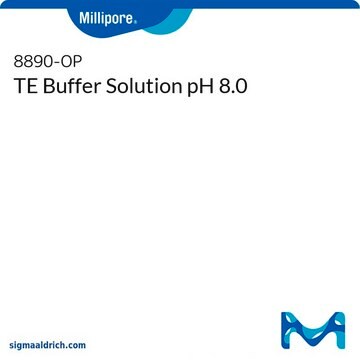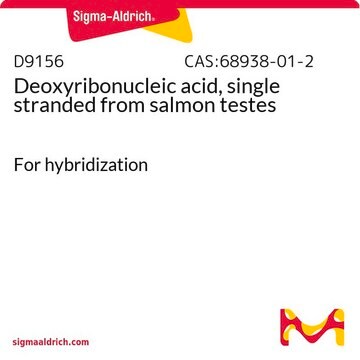T9285
Tris-EDTA buffer solution
100X concentrate for Northern and Southern blotting
Synonym(s):
Tris-EDTA wash buffer, TE buffer solution
About This Item
Recommended Products
grade
for molecular biology
Quality Level
sterility
0.2 μm filtered
form
liquid
pH
7.8-8.2 (1 × in water)
application(s)
sample preparation
foreign activity
DNase, RNase, none detected
storage temp.
room temp
SMILES string
NC(CO)(CO)CO.OC(=O)CN(CCN(CC(O)=O)CC(O)=O)CC(O)=O
InChI
1S/C10H16N2O8.C4H11NO3/c13-7(14)3-11(4-8(15)16)1-2-12(5-9(17)18)6-10(19)20;5-4(1-6,2-7)3-8/h1-6H2,(H,13,14)(H,15,16)(H,17,18)(H,19,20);6-8H,1-3,5H2
InChI key
VLEIUWBSEKKKFX-UHFFFAOYSA-N
Looking for similar products? Visit Product Comparison Guide
General description
Application
- isolate, resuspend, or store DNA and RNA for PCR or qPCR
- gel electrophoresis, including Northern and Southern blotting
- bacterial cells, for AmpC disk test, to measure β-lactamases released from the cells
- antigen retrieval for immunohistochemistry
Components
Other Notes
related product
Storage Class Code
12 - Non Combustible Liquids
WGK
nwg
Flash Point(F)
Not applicable
Flash Point(C)
Not applicable
Certificates of Analysis (COA)
Search for Certificates of Analysis (COA) by entering the products Lot/Batch Number. Lot and Batch Numbers can be found on a product’s label following the words ‘Lot’ or ‘Batch’.
Already Own This Product?
Find documentation for the products that you have recently purchased in the Document Library.
Customers Also Viewed
Our team of scientists has experience in all areas of research including Life Science, Material Science, Chemical Synthesis, Chromatography, Analytical and many others.
Contact Technical Service











